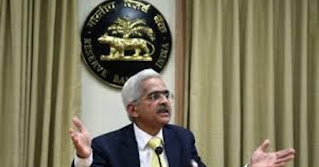The best way to deal with a crisis is to begin with admit that there is one. This confession comes from the RBI.
 |
| Banks are expected to create a Covid-19 loan book as part of the program. |
As for growth, Das seemed optimistic that the burden on the economy could be moderate than last year, although just like India the decline was on the verge of a strong recovery.
In an unscheduled speech on Wednesday morning, Governor Shaktikanta Das pointed out that both recent growth and inflation forecasts are at risk as the new crisis (see Covid-19) is still emerging.
While the course of inflation for FY22 is now directly dependent on Covid-19 infections and the effects of local lockdowns, the economic outlook was highly uncertain and was clouded by downside risks.
Last month, the central bank forecast an inflation rate of 5.2% for the first and second quarters, while growth for fiscal year 22 was 10.5%. It's unchanged or constant, but the coronavirus pandemic has made forecasting nearly impossible.
Citing preparing for the RBI battle in such unforeseen circumstances, Das has downloaded monetary instruments, as it did last year, to minimize the incoming attack on the financial system.
The RBI will encourage banks to park their surpluses under an attractive reverse repo rate and especially reach out to small businesses and MSMEs in their time of need,
open new lines of credit and enable a unique restructuring plan for loans that have already been restructured while new borrowers enter the Have the opportunity to proceed with the restructuring.
The total risk of up to 25 billion rupees is entitled to an additional two-year moratorium period. Banks can also do a one-off reorganization of accounts for small businesses and MSMEs, but bankers' calls to extend the moratorium on personal borrowers fell on deaf ears, as did calls for bad credit ratings to be broadened,
prompting the need for increased provision and affected the banks' bottom line. By March 2022, 50,000 crore is available at 4% with a term of up to three years, and banks can provide new loans to a large number of companies, including vaccine manufacturers, importers, vaccine providers, hospitals, pharmacies and others.
These loans will continue to be ranked in the Priority Sector until repayment or maturity, whichever comes first. Banks are expected to create a Covid-19 loan book as part of the program.
As an additional incentive, banks can park their surpluses up to the size of the Covid loan book, with the RBI 40 basis points above the surrender rate.
In Support of Small Businesses For micro businesses and small industries, RBI will run a special long-term 3-year buyback operation of Rs 10 billion for small financial banks that can lend up to Rs 10 billion per borrower. This holds until October 2021.
In terms of growth, Das was optimistic that the strain on the economy could be moderate than last year, although the decline comes just as India was in the foothills.
Overall demand is moderate compared to a year ago, "he argued, citing data through the March quarter, when economic activity shifted north and Covid-19 infections shifted south.
It was the beginning. In April the broke Hell loose and therefore Shaktikanta Das believes that depending on how the Covid situation evolves, conditions for aggregate demand, especially for high-contact services, may temporarily decline.
A normal monsoons in the Southwest will help contain pressure on food prices, despite increasing pressure input prices in all sectors, partly due to high global commodity prices, remains a concern.
Post a Comment
Don't allow spam link